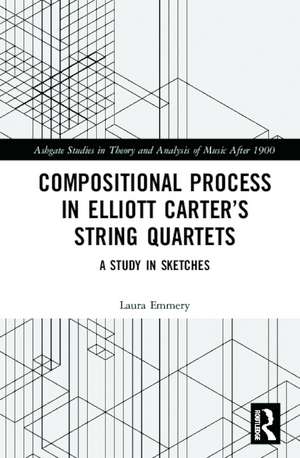Compositional Process in Elliott Carter’s String Quartets: A Study in Sketches: Ashgate Studies in Theory and Analysis of Music After 1900
Autor Laura Emmeryen Limba Engleză Hardback – 27 noi 2019
Each of Carter’s five string quartets is driven by a new idea that Carter was exploring during a particular period, which allows for each quartet to be examined under a unique lens and a deeper understanding of his oeuvre at large. Drawing on key ideas from a variety of subjects including performance studies, philosophy, music cognition, musical meaning and semantics, literary criticism, and critical theory, this is an informative volume for scholars and researchers in the areas of music theory and musicology.
Analyses are supplemented with sketch study, correspondence, text manuscripts, and other archival sources from the Paul Sacher Stiftung, the Library of Congress, and the New York Public Library.
| Toate formatele și edițiile | Preț | Express |
|---|---|---|
| Paperback (1) | 311.41 lei 6-8 săpt. | |
| Taylor & Francis – 30 iun 2021 | 311.41 lei 6-8 săpt. | |
| Hardback (1) | 765.45 lei 6-8 săpt. | |
| Taylor & Francis – 27 noi 2019 | 765.45 lei 6-8 săpt. |
Preț: 765.45 lei
Preț vechi: 1028.14 lei
-26% Nou
Puncte Express: 1148
Preț estimativ în valută:
146.47€ • 152.63$ • 121.28£
146.47€ • 152.63$ • 121.28£
Carte tipărită la comandă
Livrare economică 03-17 aprilie
Preluare comenzi: 021 569.72.76
Specificații
ISBN-13: 9780367151324
ISBN-10: 0367151324
Pagini: 268
Dimensiuni: 156 x 234 x 19 mm
Greutate: 0.52 kg
Ediția:1
Editura: Taylor & Francis
Colecția Routledge
Seria Ashgate Studies in Theory and Analysis of Music After 1900
Locul publicării:Oxford, United Kingdom
ISBN-10: 0367151324
Pagini: 268
Dimensiuni: 156 x 234 x 19 mm
Greutate: 0.52 kg
Ediția:1
Editura: Taylor & Francis
Colecția Routledge
Seria Ashgate Studies in Theory and Analysis of Music After 1900
Locul publicării:Oxford, United Kingdom
Public țintă
Postgraduate and UndergraduateCuprins
Introduction
Chapter 1: Elliott Carter’s First String Quartet: in search of Proustian time
Chapter 2: Elliott Carter’s Second String Quartet: formation of a new harmonic language and character-continuities
Chapter 3: Elliott Carter’s Third String Quartet: separation in time and space
Chapter 4: Connecting the dots: compositional process in Elliott Carter’s Fourth String Quartet
Chapter 5: A synthesis: Elliott Carter’s Fifth String Quartet
Appendices
Bibliography
Chapter 1: Elliott Carter’s First String Quartet: in search of Proustian time
Chapter 2: Elliott Carter’s Second String Quartet: formation of a new harmonic language and character-continuities
Chapter 3: Elliott Carter’s Third String Quartet: separation in time and space
Chapter 4: Connecting the dots: compositional process in Elliott Carter’s Fourth String Quartet
Chapter 5: A synthesis: Elliott Carter’s Fifth String Quartet
Appendices
Bibliography
Notă biografică
Laura Emmery is Assistant Professor of Music Theory at Emory University. Her research focuses on 20th-/21st-century music and post-tonal theory, with an interdisciplinary approach that draws on philosophy, literary criticism, critical theory, and performance studies. Having spent over two years at the Paul Sacher Stiftung conducting a critical study of the original sources, her analysis of Elliott Carter’s music incorporates sketch study in tracking the composer’s evolution and process. Her work on Carter has been published in The Musical Quarterly, Contemporary Music Review, Tempo, Twentieth-Century Music, Sonus, Mitteilungen der Paul Sacher, and Form and Process in Music, 1300-2014: An Analytical Sampler. Laura Emmery holds a PhD in Music Theory from the University of California at Santa Barbara and an MM in Theoretical Studies from the New England Conservatory of Music.
Recenzii
This book provides valuable insights into Carter’s compositional processes that go far beyond the “little problems” of “brief passages.”... Her investigation provides a welcome contribution to sketch studies, while leaving open many avenues for further research in Carter’s music.
Peter Smucker, Stetson University School of Music
Peter Smucker, Stetson University School of Music
Descriere
This is an interdisciplinary study examining the evolution and compositional process in Elliott Carter’s five string quartets. The book’s narrative reveals new aspects of understanding these works and draws novel conclusions on their collective meaning and Carter’s place as the leading American modernist.












